
Hurricane Ian Was Approaching. My House Was Shaking. I Didn’t Know What to Do.
This story contains a discussion of suicide. If you or someone you know is in crisis, text or call 988 to reach a trained mental health counselor. The service is free, confidential and available 24 hours a day.
I have been living in Englewood for a year and half now, in contented retirement with my friend Tom, whom I consider my adopted son. Tom has various special needs and I am glad to serve as his caregiver. Rounding out the family is our pug Meatball. We have a mobile home, which many people still call a trailer, and we live in a mobile home park, which many people still call a trailer park. It’s called Sandalhaven Estates.
I like to think it is one of the better parks. You own your own lot, and they’re 50 feet wide. The homes themselves are extremely comfortable, with the insides much nicer than their outsides, and they’re affordable, in an area where affordable housing is in short supply. But, they have a major drawback: Some inner sense in your body and brain keeps telling you that you are not in a real house. Mobile homes are made, not built.
The day before Hurricane Ian hit, the park was in a state of anxiety as everyone tried to figure out what to do. There was a mandatory evacuation order for all mobile homes, but all that meant was that you couldn’t call 911 if the winds topped 45 miles per hour. You could stay if you wanted to; no one was going to drag you off.
I’ve lived in Florida for almost four decades, and during that time have learned to pretty much ignore hurricane warnings. It’s always the same. Some storm forms in the Caribbean and they say it might come our way and it never does. I still have cans of tuna and a package of batteries I bought seven or eight years ago.
Most of my neighbors were leaving to stay with friends or relatives in safer places. One couple left for a motel in West Palm Beach. My friend Liz from across the street was going to her sister’s house, which was brick and mortar. My closest friends in Sarasota were all out of town or living on a key and thus no help. I felt uneasy asking for assistance outside of my inner circle. After all, there were three of us, including Meatball.
There were shelters we could go to, but they sounded uncomfortable in the extreme. As far as I could figure out, you slept on the floor of a gym, and you had to bring your own bedding and a folding chair. Plus, Meatball wouldn’t be allowed in without a crate, and he didn’t have one. So the decision was made: We would stay at home. How bad could it be?
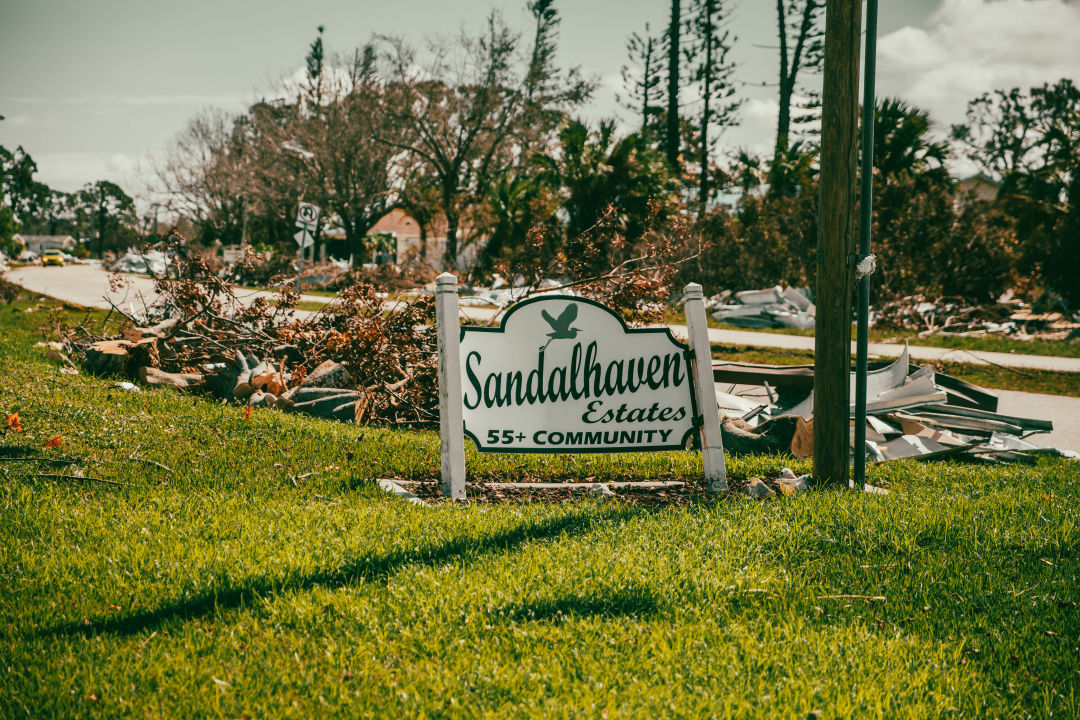
Sandalhaven Estates, after Hurricane Ian.
Image: Hannah Phillips
That night, the storm, which had been lolling around the area for the past two days, changed. It was no longer raining and windy. This was something else. Our house was shaking and fierce sheets of water were coming from all directions. Things had switched from worrisome to scary, and we had to get out of there. Around midnight I came up with a new plan.
The storm wasn’t supposed to actually make landfall until 2 p.m. the next afternoon. That seemed like plenty of time to make a beeline to the east, so I decided we would leave at dawn. The TV people told me it was too late to evacuate, to stay and hunker down instead. But the TV people weren’t in my shuddering trailer.
We left just before 7 a.m., with a couple backpacks stuffed with some clothes and the all-important meds for the three of us. I also took cash ($240), my Cartier watch, my vaccine card and a letter I once received from Madonna, telling me she thought my writing was brilliant but depressing. Tom took his favorite tchotchkes—a little Snoopy statue and his favorite sneakers. He also insisted we bring my will. Meatball was in no mood to bring anything.
Dawn never really came. We drove down River Road toward I-75 under a dark gray sky. Already, big puddles of water had formed, but we didn't see any downed tree limbs yet. The interstate was eerily empty. The other cars were either driving very fast or very slow. We were probably the slowest. I only have vision in one eye and really shouldn’t have a driver’s license, much less be driving during a hurricane. It got so bad that I couldn’t see where the road was, so I got behind a truck and followed its red tail lights.
Our goal was Okeechobee. We got off 75 in Punta Gorda and drove toward Arcadia, the next big town. After a half hour or so, the intensity of the storm was lessening. I congratulated myself. We had done the right thing. We might have to sleep in the car, but so what? I looked at the gas gauge. We had a little over half a tank.
In Arcadia, I was shocked to find all the gas stations closed. Why on earth would they be closing gas stations in Arcadia? In fact, nothing was open but a Burger King with an endless line at the drive-through. We proceeded on and found a little green BP station that was open and surrounded by a mob of cars. We got in line. After 10 minutes, some kindhearted person told me we were in the line for deisel. Once we found the correct pump, we filled up and I tried to maneuver out of the mob scene of cars and trucks. I finally peeled out over the grass until I came to screeching stop. I had run over a protruding rock and our car was stuck. Saying a prayer, I backed up, which caused a horrendous scraping sound, but we managed to pull off the rock. Was the bottom of the car damaged? It was a worry that would come back to terrify me.
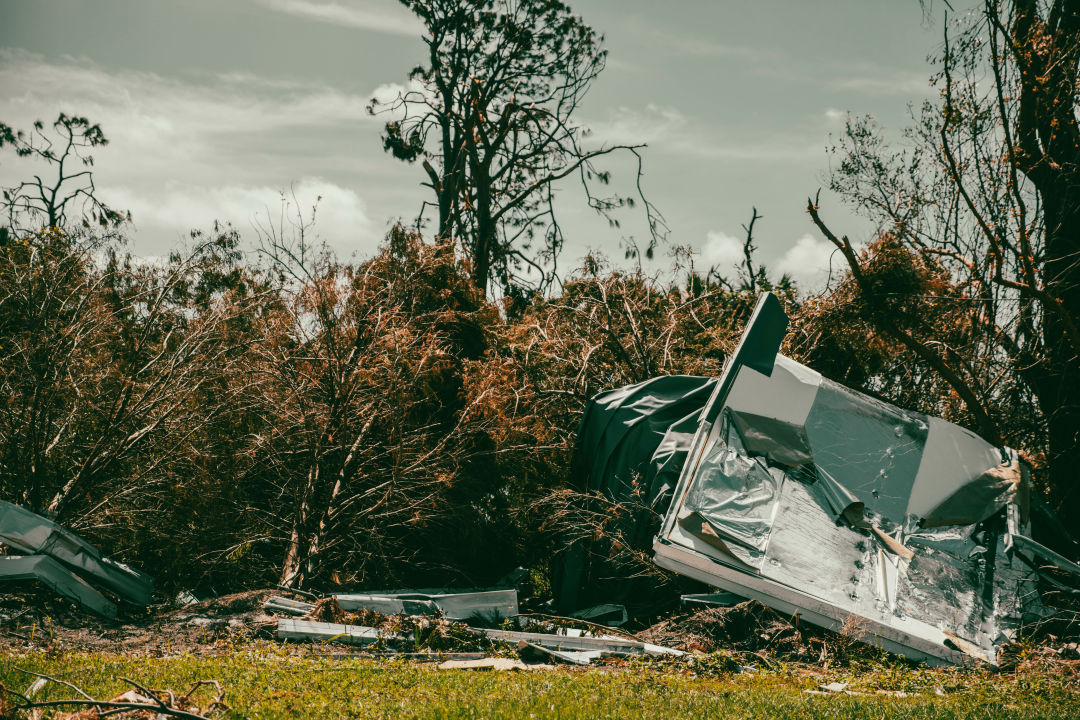
Damage from Hurricane Ian at Sandalhaven Estates.
Image: Hannah Phillips
I know Okeechobee pretty well, having driven through it on my many trips to the monthly West Palm Beach antique show. It’s an old town, with a little downtown area. Not as charming as Arcadia, but it has a unique attraction: the lake. You never really see it, since a berm perhaps 30 feet high hides it from view. There was a terrible hurricane here back in 1928 that killed 2,500 people. Today, the town is mainly known as a sort of low-budget fishing resort. For miles along the unseen lake, you see old cabins and trailers that are rented out as fish camp accommodations. I felt certain that if all the motels were full—and I was certain they would be—we could probably rent one of those rusty trailers for the night.
I pulled into the first motel we passed, a new three-story place, a Holiday Inn Express, and it looked like heaven. I decided I would pay any price, up to $500. Inside the lobby there was a hectic atmosphere, which I assumed was caused by the barely controlled panic of the refugees. They were huddled in front of a TV, sitting on every available seat, with kids on the floor.
Behind the desk, a poor overworked woman was arguing on the phone about something. I stood there for several minutes until she finished her unhappy conversation.
“I know this is a longshot,” I said, “but do you have a room?”
She looked around at the mob in the lobby and leaned forward confidentially. “I have one room left," she said. "$169."
I couldn’t believe my luck. Before I ran out to the car with the good news, I glanced at the TV and found out why everyone seemed so nervous. The hurricane was coming here.
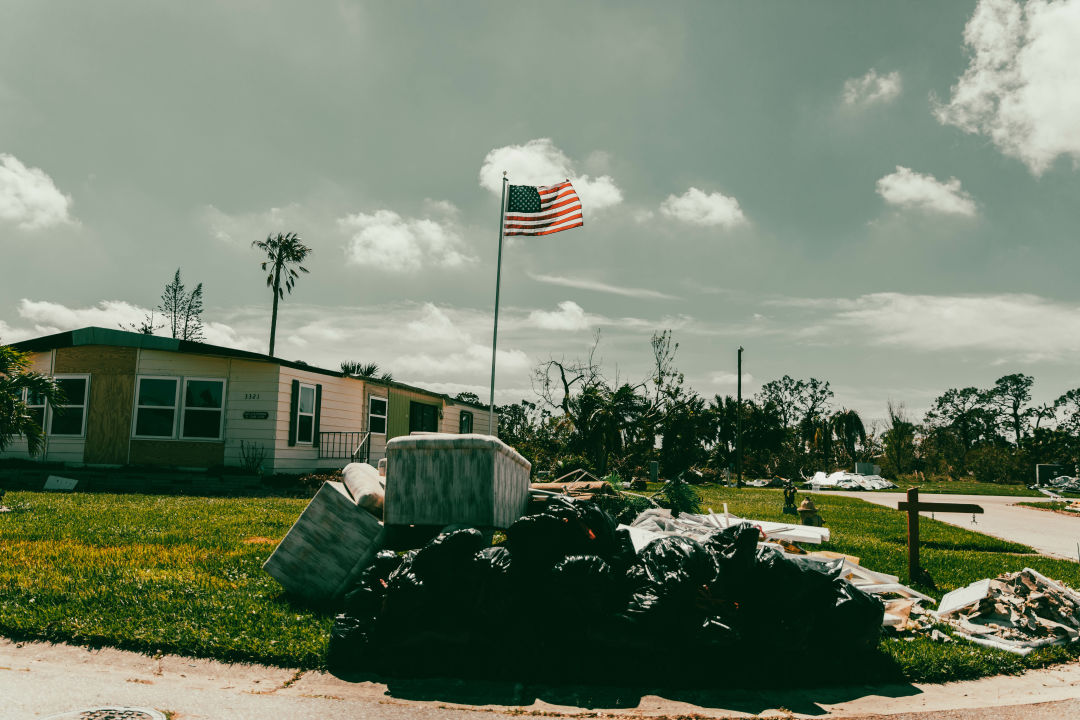
Debris from Hurricane Ian in Sandalhaven Estates.
Image: Hannah Phillips
We couldn’t get into the room for three hours, so we did the stupidest thing imaginable. We drove around. If you derive any takeaway from this article, it should be this: Get gas. Every chance you get. Drive as little as possible. Get one of those red gas cans and keep it in the trunk. Gas, more than food or water, is what can really save your life. And there we were, driving around Okeechobee like a couple of idiots, wasting gas while looking for a Subway.
Here's another hurricane tip: Buy a therapy dog harness. We got one for Meatball as a joke years ago, and it came in handy in Okeechobee. The motel didn’t allow dogs, but when we returned to check in, they had to accept him.
Unfortunately, our therapy dog was spiraling. He’s a homebody who refuses to go outside if it’s raining, and the strain of the past several days was beginning to show. When we woke up the next morning to a hot room and no electricity and I had to take him downstairs for his walk, he took one look at the stairs and refused to budge. So I carried him.
If the wind looked calmer through our window, it sure didn’t once you got outside. It blew me over and I rolled down an embankment, dragging Meatball with me. I then had to carry him back to the room, up three flights, in the dark, with a sprained knee, wondering if this would qualify as a hurricane injury that maybe I could get some money for.
The front desk called at 10 a.m. and said we had to leave in an hour. They had to honor a previous reservation. So what were we to do? Tom and I both knew at once what we wanted—to go home. Even though Ian had just knocked me down, the storm had passed to the north. The damage had been done. We might as well go home and find out what happened. I figured we had just enough gas to make it back to Englewood.
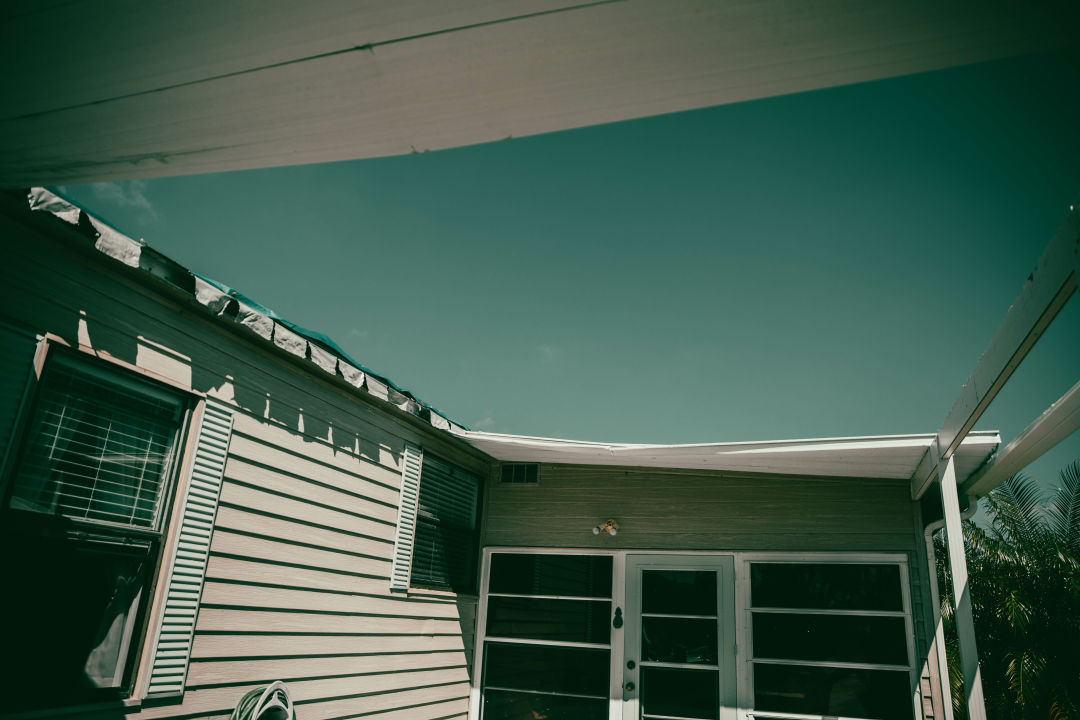
Outside the author's home in Sandalhaven Estates.
Image: Hannah Phillips
That afternoon turned out to be the most dangerous part of our ordeal. I expected the coast to be flooded, but the middle of the state? Where on earth did all this water come from?
It was 110 miles from Okeechobee to Englewood. The water started about 20 miles out of Okeechobee. It was no problem at first. You just drove through it, splashing the cars coming in the opposite direction and getting splashed by them.
But when we got to Arcadia, things were different. There was water everywhere. People were riding around in boats. On the west side of town, where the Peace River flows through, things grew worse. State Road 72, which goes down to Port Charlotte, was closed entirely. The only way out of town was to continue on State Road 70, toward Bradenton.
There was a long line of cars and trucks, all of us in the same predicament. Could you actually drive through these swaths of water? There were no police, no one in authority to tell you if it was safe, if the water was shallow enough. You were on your own.
And there was no turning back. The next 40 miles was a nightmare. This wasn’t just standing water. It rolled in waves across the road, changing depth, getting deeper, then disappearing for a mile or so, then appearing again. Some cars didn’t make it. Vehicles were stalled everywhere. We found ourselves stuck behind a flooded-out Cadillac and I thought we were finished. But we managed to get around it, leaving the poor Caddy to fend for itself. I remember the terrified faces of the people in the car. But we had to keep going. I didn’t dare stop.
Two thoughts kept going through my mind. No. 1: How stupid of me to attempt this. No. 2: What about the damage to the bottom of my little Kia Soul from the rock we ran over the day before? I could feel something happening to the brakes. They were locking. The car was starting to groan and creek, like an old boat. Poor Meatball kept looking at me, and when a particularly big splash of water hit the car he would squeal.
Against all odds, we made it to Bradenton—where all the traffic lights were out and the gas stations were closed, with the pumps wrapped in big sheets of plastic. My phone had stopped working. We could have stayed there, perhaps driven to a friend’s house and begged for help, but no. We had just enough gas to get home. For better or worse, we would spend the night at the trailer.
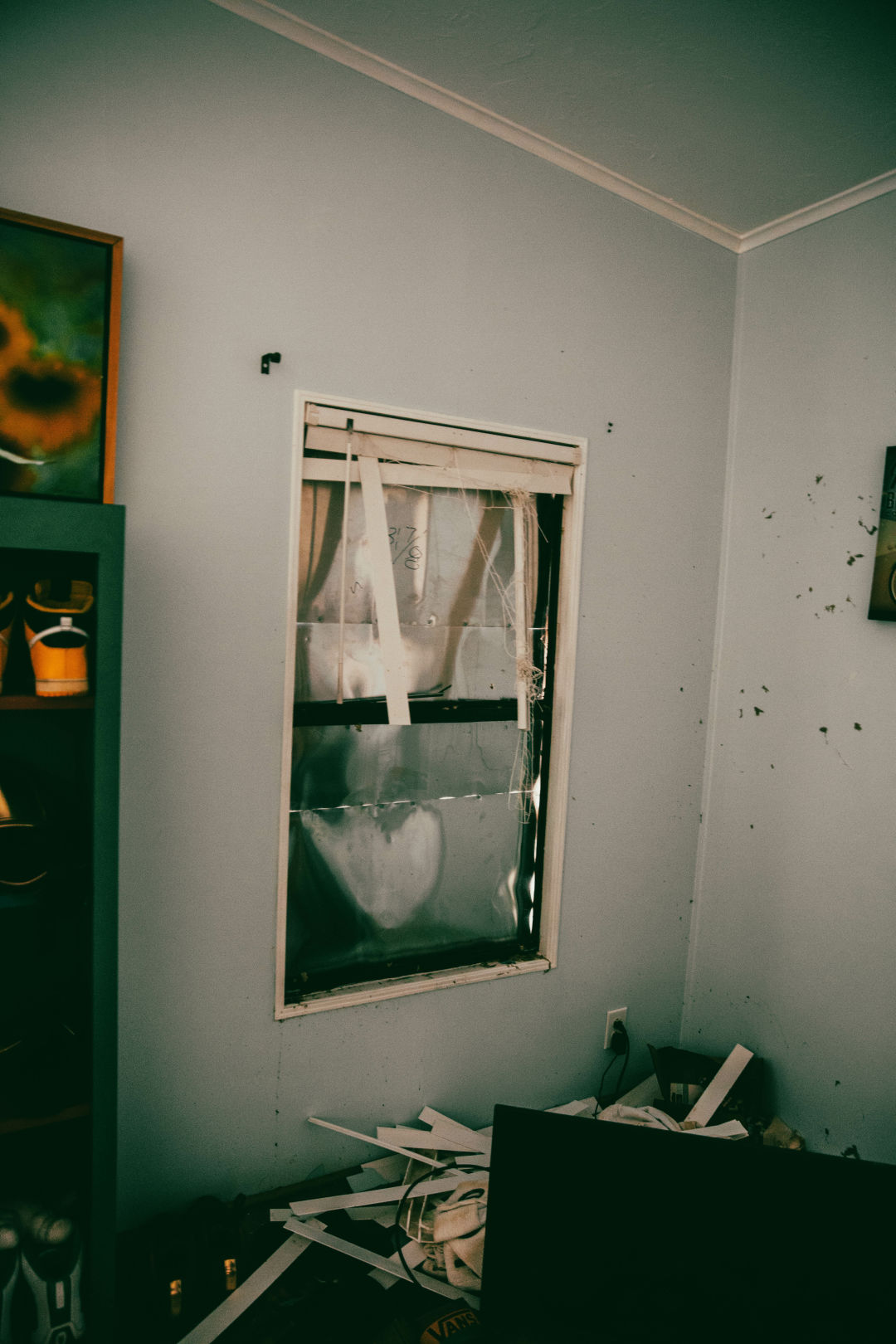
Damage inside the author's home in Sandalhaven Estates.
Image: Hannah Phillips
When we pulled into Sandalhaven, the place was difficult to recognize. Most of the trees had been blown down. It was like you were seeing somebody you loved and respected, your grandmother perhaps, without their clothes on.
Roofs had been ripped out, corners and sides were missing and there was not a carport left in the park. White strips of metal—maybe 12 feet long and one foot wide—were scattered around the streets and bent around fallen trees, each one crumpled in a different way. Pieces of wood with nails sticking out of them had been blown all over. Fallen trees blocked streets and lay on tops of homes. At one end of Audubon Avenue was an impassable flood.
A few of the homes—the newer and better built—were in relatively good shape, missing some siding and their sunrooms. But for every one of those, there were 20 that were wrecked. Bedrooms had been torn open to the elements, roofs were half ripped off and cars were buried under debris.
At first glance, I had high hopes for our place. As we drove up, inching our way through the mangled wreckage, I could see that it was all in one piece, with only two visible holes. But the roof didn’t look right. The white membrane that covered it was gone, and it was now just plywood.
Inside, a smell had already developed. In the living room, a window had been blown out and the wind and the rain had soaked the dining room table and chairs, not to mention all my tax documents that I left there as we fled. The living room furniture was wet, and along the sides of the ceilings you could see big water stains. In fact, you could see water stains everywhere.
In the kitchen, the stove was drenched. Water had come in through the range vent. Tom’s room had the worst damage. A window was missing and everything had gotten wet. His TV was on the floor, the mattress soggy to the touch. Everything was covered with broken glass. Even if you avoided picking things up, tiny slivers of glass were always sticking in your hands and feet.
The carport was gone. The roof to the lanai had caved in and everything out there got soaked—as did everything in our storage room, where another window had disappeared.
As far as I could tell, we were the only people in the park. It was totally quiet, just the birds singing and the metal panels groaning in the breeze.
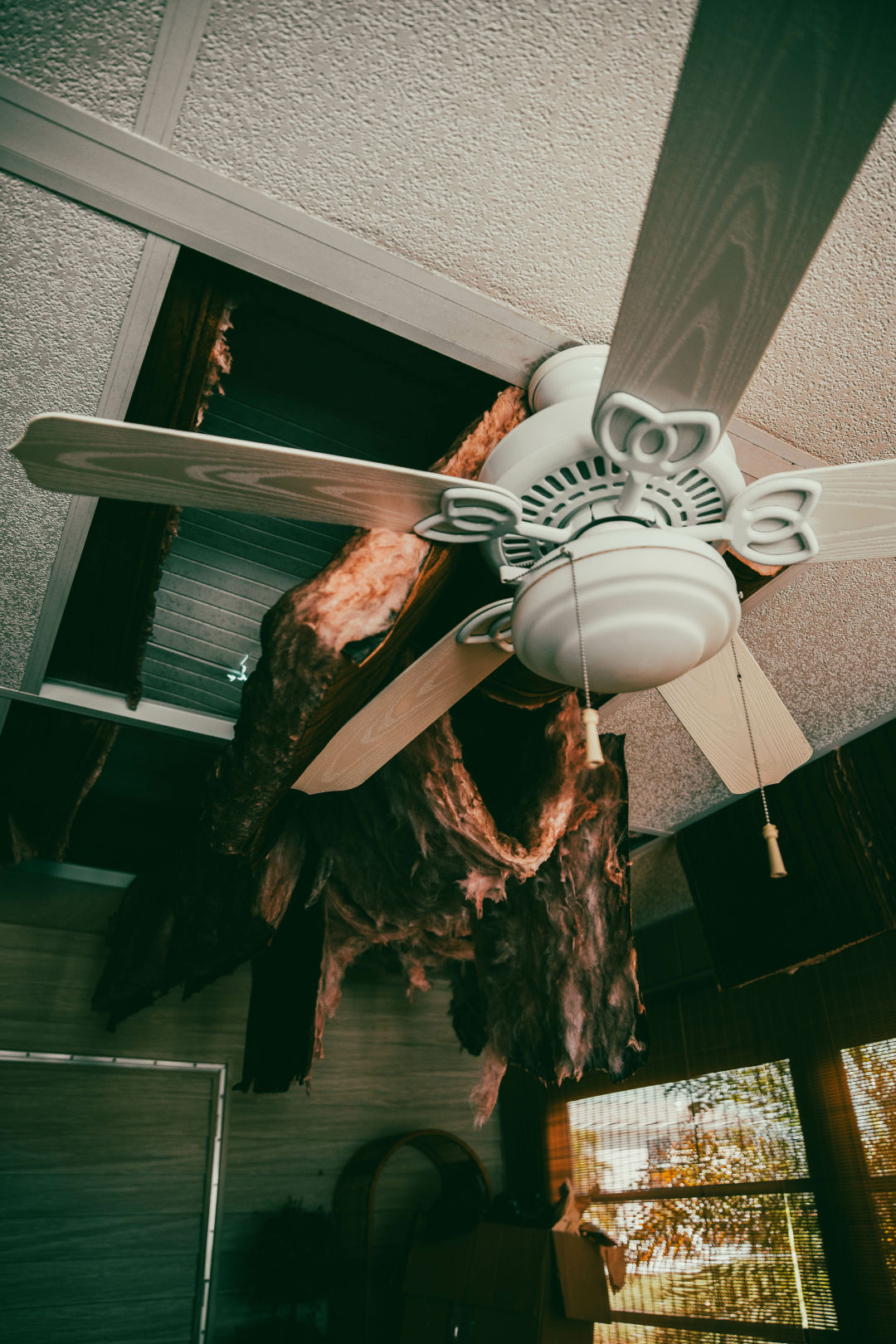
Damage inside the author's home in Sandalhaven Estates.
Image: Hannah Phillips
We stayed there for the next four days. There was nothing else we could do. We were almost out of gas and there was no way to get any.
I sat on the still-damp couch for hours at a time, trying to figure out what to do. That is the mantra of people caught in a disaster: “I don’t know what to do.” I heard it over and over from almost everyone I met. You are suddenly, out of the blue, faced with problems you’ve never faced before and don’t know anything about. Do you leave or stay? Which route should you take? Will it be any better there? How do we get gas, cash, food, a place to sleep? How deep is that water? The wrong decision can have enormous consequences, from inconvenience to death. So you sit there, paralyzed and exhausted, saying, “I don’t know what to do.”
A few of my neighbors had stayed in their homes through the storm. They were fine and no one had been injured. It was good to know we weren’t alone. The next day, more people started coming back and a little community came to life. It soon became clear how we should be using our time—getting this place cleaned up.
First, all the trees blocking the street had to be moved—by hand, using a chainsaw. Then blown-out windows had to be boarded up. I was definitely the weakest member of the cleanup team, but I swear I tried. I am a good 10 years older than most of the men in the neighborhood and I tend to lose my balance if I do anything physical in the hot sun for more than 10 minutes.
I could only watch in awe as my next-door neighbors, after volunteering to board up my broken windows, then proceeded to trim the rough edges off their own house, bring their possessions out to dry in the driveway, turn their missing sunroom into an outdoor patio complete with porch furniture, clear all the debris out to the curb and put it in neat piles and then mow their lawn.
We had no water, no electricity. We went to sleep on the living room couches around 7:30 p.m., with a fading sunset outside. We got up at dawn, although I actually woke about an hour earlier and lay there worrying. I had no phone service. I couldn’t call anybody and tell them I was OK or ask them to come rescue me.
The days were very long and very hot. I tried to clean the yard—an endless task. Among the things I found: my neighbor’s roof, a blender, an enormous amount of Styrofoam, a five-foot-long wrought-iron lizard, a wicker chair, an ice bucket and a photograph of a young family sitting under a Christmas tree.
Never once did I see any sort of official figure. No one from FEMA, no police, no fire. What I did see were people from church. Englewood is a very church-conscious town and members sprang into action. Every day, they would drop by to check on us and bring us food. Once it was a pizza, and Meatball got his own slice. Other days, it was just Beanee Weenees and potato chips, but it was heartwarming to be the recipients of genuine Christian charity.
Every morning, I listened to a local station on Tom’s transistor radio. The channel was broadcasting a nonstop call-in show, with some people asking questions (“Where can I get ice?” was the most popular query) and other people calling in with important information to impart, like which streets in North Port were still flooded or the news that I-75 had reopened, or reclosed. Some callers faced heartrending dilemmas. One woman couldn’t find her 104-year-old mother-in-law. Another was trapped in her house in North Port and wanted to know how much higher the water would rise.
The calls I listened for involved gasoline. There were rumors you could get it at a certain station in Port Charlotte, but I never heard which street it was on and I didn’t want to get stuck in another flood. One caller said they had it at BJ's, but you had to be a member. Then a lady came on and said they had gas at a Sunoco station on Indiana Avenue. That was only about five miles away. I jumped in the car.
It was just a rumor. There was no gas. Handwritten signs all over the station told hopeful drivers, “No Gas and We Don’t Know When.” But me and about 50 other people were suddenly descending on the place, giving the appearance of a gas line. Passersby saw this and joined it, and the scene descended into chaos.
As I managed to pull out, my glance fell on an elderly couple, both with canes, standing next to an ancient car. They were crying. I know I should have stopped and tried to help them, but in such circumstances, it was every man for himself. I asked everyone I saw if they knew where I could get some gas or if they would sell me some. No one could—or would. I even had a conversation with one of the neighbors about how we might siphon gas out of the snowbirds’ cars, the ones buried under all the debris.
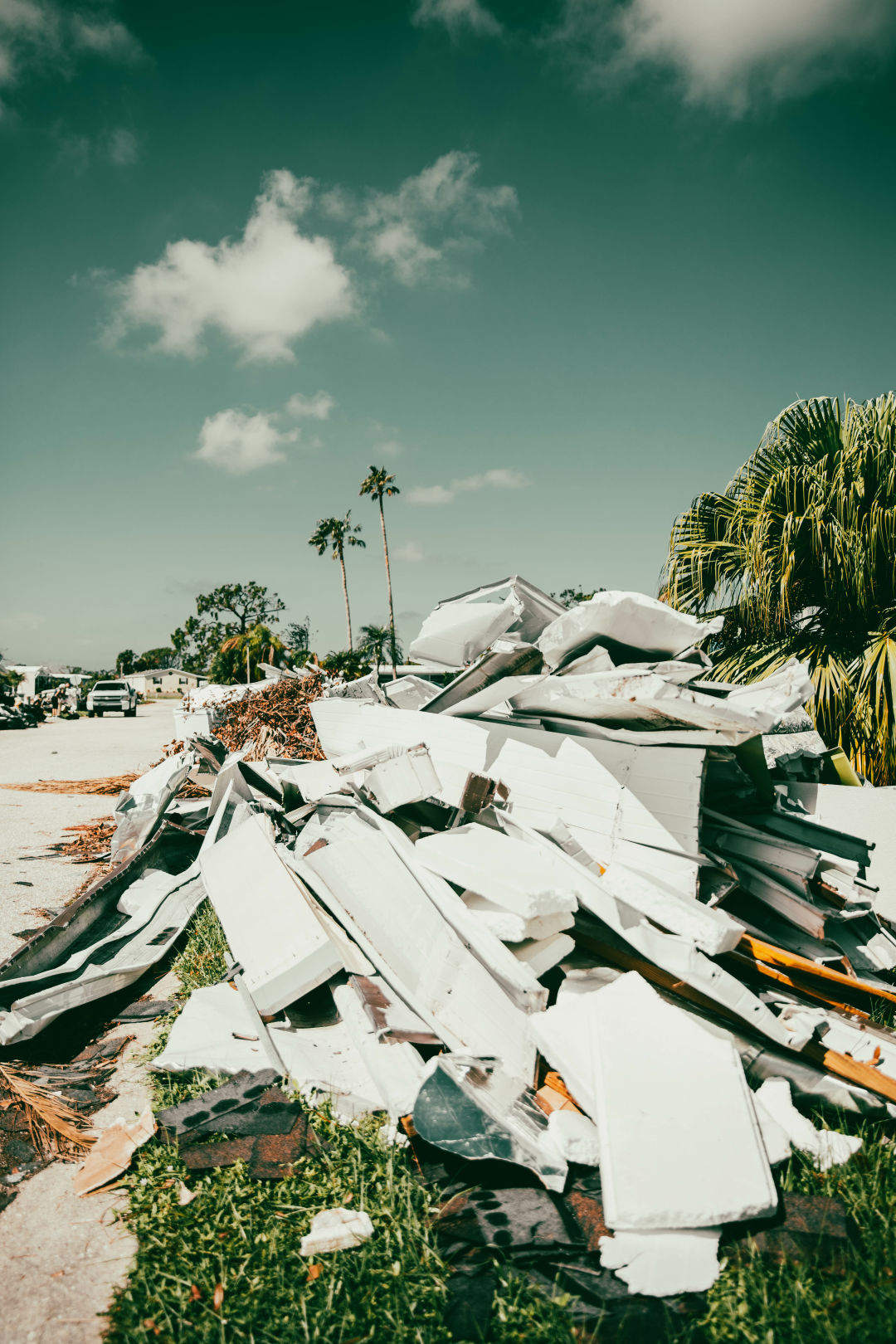
Debris stacked on the street in Sandalhaven Estates.
Image: Hannah Phillips
We are a household that revolves around meds, and a problem was developing. I had enough for another two weeks, as did Tom, but Meatball was low on his phenobarbital. He had enough for just one more day.
Meatball suffers from epilepsy and takes levetiracetam and phenobarbital twice daily. If he misses so much as one dose, he is likely to have a seizure and he can have as many as three or four within a 24-hour period. They are painful to watch. The vet says they do him no real harm, but they are still dangerous. If he’s on a bed or a couch, he can slide off and fall headfirst onto the floor.
But phenobarbital is a controlled substance and you can’t get refills. You must get a new prescription each time. Meatball's vet was up in Bradenton, and I had no phone and no gas. The hours were ticking by. Once again, I didn’t know what to do.
Then, a miracle. The people from the Baptist church came by with our daily food supply and to do a wellness check and they asked me if I needed gas. I had never been so excited. They poured some from a red can into my tank and then we all held hands and said a prayer. They couldn’t give me much, but I now had almost half a tank.
We planned our escape. A change of clothes, Meatball’s dog food, everyone’s meds, and we set off. Someone told me that if you went to a certain Publix and rebooted your phone, it would start to work again. They were right. In 10 minutes, Meatball’s prescription was in the works, my family found out we were still alive and I was texting friends, begging for a place to stay. Gigi said we could sleep on a couch at her niece’s house. Enrique said we could sleep in his garage. Bruce said he’d like to help, but was allergic to dogs. Then, a text from Dan. We could stay in his fancy new guest house, the one that won an architectural award, with an enormous TV and, best of all, air conditioning.
Our ordeal was over.
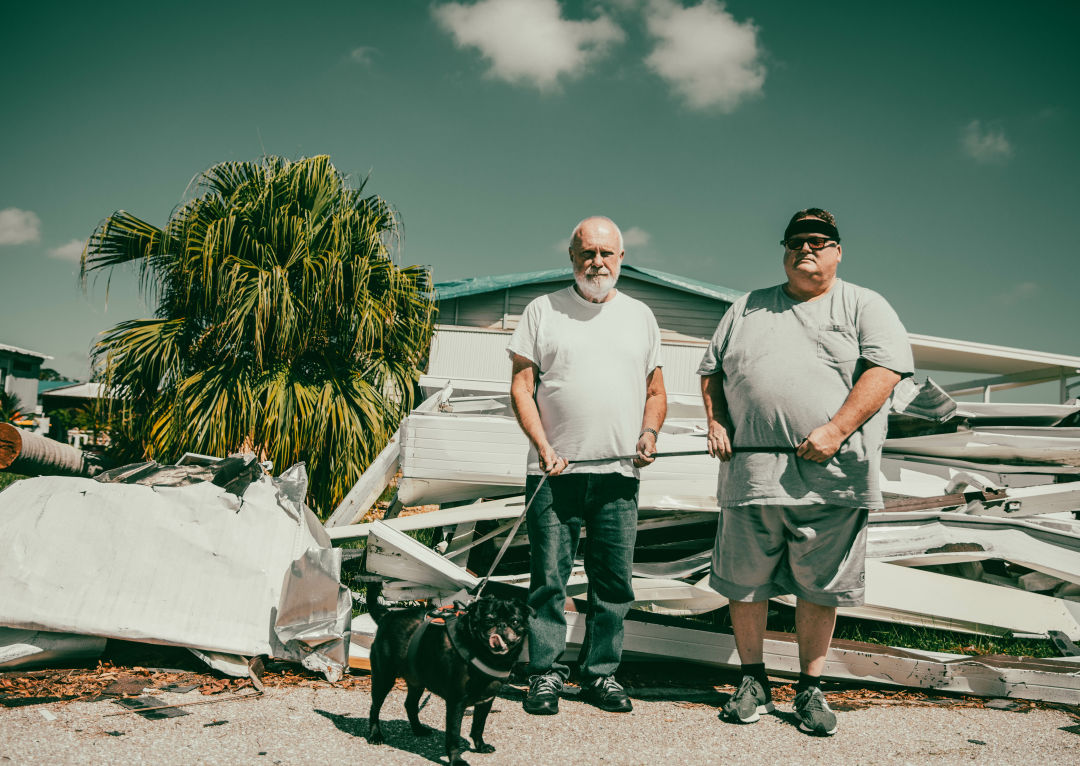
The author (left), Tom and Meatball.
Image: Hannah Phillips
Of course, it wasn’t really over and it won’t be for years. I know that, under the circumstances, it’s appropriate to say, “We’re still alive and that’s the important thing. Everything can be rebuilt.” But when you’re 78, you see things differently.
In the accounting of people who died during the storm, there were some old men who committed suicide. I understand this completely. They had lost everything. How do you summon up the energy and the hope to move on? Your home is gone, your finances are in ruins and you don’t know how to get help. You don’t even know what help you need. You are overwhelmed. I don’t know if I could live through another Ian.
I guess I’m lucky that I have people depending on me. Tom needs care and Meatball needs his phenobarbital. And it warmed my heart to see the way Englewood came together. So many people are much worse off than me, but the neighbors and the churches—and, finally, FEMA—got to work. Slowly, the town is coming back to life.
But I have a bone to pick with Billy Graham. While sitting in my hot, wet, steaming house and dreading the possibility of rain, my neighbor Liz ran over and said that she heard you could get a free tarp up at Calvary Baptist Church. This was a gas-worthy errand. So we jumped in her car and drove there, constantly having to adjust our route due to flooding.
When we arrived, we could see big trailers set up, with the Billy Graham ministry logo on the side. A man named Bobby helped me fill out an application and insisted that the tarp was entirely free and would be installed to the utmost professional standards. I signed on the bottom line.
Then Bobby took me aside. “Are you going to heaven?” he asked.
“I hope so,” I said.
“You know how to guarantee it?”
“How?” I asked.
“Accept Jesus as your savior,” he said.
“OK,” I said, thinking, “As long as it gets me a free tarp.” We held hands and said a prayer.
The promised tarp never arrived. I finally had to hire a couple of guys and it cost me $1,800. But I’m wondering: Do I still go to heaven? God knows I’ve been to hell and back.